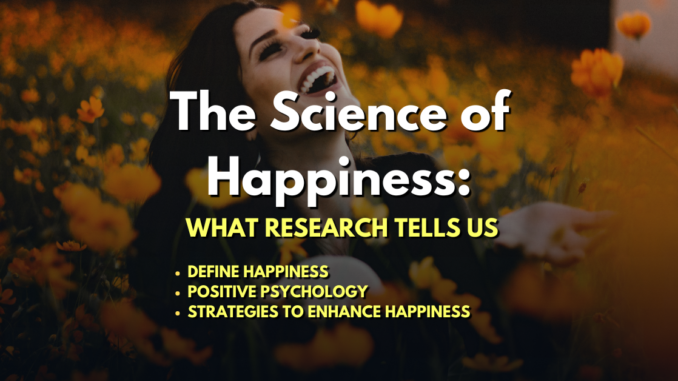
Happiness is a complex and multi layered emotion that has intrigued scientists for decades. Understanding what makes us happy and how we can cultivate happiness is absolutely important for leading a fulfilling life. Here’s a deep dive into what research tells us about the science of happiness.
Defining Happiness in Easy words
Subjective Well-Being: Happiness is often measured as subjective well-being, which includes life satisfaction, positive emotions, and the absence of negative emotions.
Components of Happiness: Happiness can be divided into three components: pleasure (hedonic happiness), engagement (flow), and meaning (eudaimonic happiness).
Also Read: 444+ Helpful Affirmations for Everyday
3 Key Factors that influence Happiness
1. Genetics
Genetic Set Point: Research suggests that genetics account for approximately 50% of our baseline happiness levels. This means some people may naturally have a more positive disposition.
Twin Studies: Studies on twins have shown that identical twins tend to have similar levels of happiness, even when raised apart, highlighting the role of genetics.
2. Life Circumstances
External Factors: Life circumstances, such as income, marital status, and health, contribute about 10% to our overall happiness. While these factors can influence happiness, their impact is relatively small compared to other elements.
Adaptation: Humans tend to adapt to changes in life circumstances, a phenomenon known as the hedonic treadmill. For example, a salary increase might boost happiness temporarily, but people often return to their baseline happiness level over time.
3. Intentional Activities
Voluntary Actions: The remaining 40% of our happiness is influenced by intentional activities and choices we make. This includes how we think, how we behave, and how we interact with others.
Mindset and Habits: Developing positive habits and a growth mindset can significantly enhance happiness. Practicing gratitude, engaging in acts of kindness, and nurturing relationships are powerful ways to boost well-being.

5 Evidence-Based Strategies for Enhancing Happiness
1. Gratitude
Gratitude Journaling: Regularly writing down things you are grateful for can increase your overall happiness and well-being.
Gratitude Visits: Expressing gratitude directly to others, such as writing thank-you notes or making gratitude visits, can strengthen relationships and increase happiness.
2. Positive Relationships
Social Connections: Strong social connections and supportive relationships are among the most significant predictors of happiness. Investing time in nurturing these connections is crucial.
Acts of Kindness: Engaging in acts of kindness, whether small or large, can increase positive emotions and creates a sense of community and belonging.
3. Mindfulness and Meditation
Mindfulness Practice: Mindfulness involves paying attention to the present moment without judgment. It has been shown to reduce stress, enhance emotional regulation, and improve overall well-being.
Meditation: Regular meditation practice can increase positive emotions, reduce anxiety, and promote a sense of peace and contentment.
4. Physical Activity
Exercise: Regular physical activity is linked to increased happiness. Exercise releases endorphins, which are natural mood boosters, and can also improve self-esteem and reduce symptoms of depression and anxiety.
Outdoor Activities: Spending time in nature and engaging in outdoor activities can further enhance the positive effects of exercise on mood and well-being.
5. Meaning and Purpose
Finding Purpose: Having a sense of purpose and meaning in life is strongly correlated with happiness. This can come from various sources, such as career, relationships, hobbies, or volunteer work.
Eudaimonic Happiness: Focusing on personal growth, contributing to the well-being of others, and pursuing meaningful goals can lead to lasting happiness and fulfillment.

The Role of Positive Psychology
1. Positive Psychology Movement
Foundations: Positive psychology, pioneered by Martin Seligman and others, focuses on studying what makes life worth living and how individuals and communities can thrive.
Key Concepts: Core concepts include positive emotions, engagement, relationships, meaning, and accomplishment (often abbreviated as PERMA).
2. Positive Interventions
Evidence-Based Practices: Positive psychology interventions, such as practicing gratitude, cultivating optimism, and building resilience, have been shown to enhance well-being and reduce depressive symptoms.
Application: These interventions can be applied in various settings, including schools, workplaces, and clinical practice, to promote mental health and well-being.
Follow the Dnyan Power: Inspired Life channel on WhatsApp to get regular updates and read insightful articles everyday!
Overcoming Barriers to Happiness
1. Negative Bias
Evolutionary Perspective: Humans have a natural tendency to focus on negative experiences due to evolutionary survival mechanisms. This negative bias can hinder happiness.
Shifting Focus: By consciously shifting focus towards positive experiences and practicing gratitude, we can counteract the negative bias and enhance well-being.
2. Societal Pressures
Cultural Expectations: Societal pressures and cultural expectations regarding success, beauty, and material wealth can create stress and detract from happiness.
Authenticity: Living authentically and aligning actions with personal values rather than societal norms can lead to greater fulfillment and happiness.
3. Mental Health Challenges
Depression and Anxiety: Mental health conditions such as depression and anxiety can significantly impact happiness. Seeking professional help and utilizing therapeutic interventions is crucial for managing these conditions.
Support Systems: Building strong support systems and practicing self-care are vital for maintaining mental health and well-being.
3 Practical Exercises to Boost Happiness
1. Three Good Things
Daily Practice: Each night, write down three good things that happened during the day and why they were positive. This practice can shift focus to positive experiences and enhance gratitude.
2. Loving-Kindness Meditation
Meditation Practice: Practice loving-kindness meditation by sending positive thoughts and wishes to yourself and others. This can increase positive emotions and foster a sense of connection.
3. Savoring
Savoring Moments: Take time to savor positive experiences, whether it’s enjoying a meal, spending time with loved ones, or appreciating nature. Savoring can enhance the intensity and duration of positive emotions.
Conclusion
The science of happiness provides valuable insights into how we can cultivate a fulfilling and joyful life. By understanding the factors that influence happiness and implementing evidence-based strategies, we can enhance our well-being and lead a more meaningful life.
Apply these practices in your daily life and explore what works best for you. Remember, the journey to happiness is unique for each individual, and small, consistent steps can lead to significant positive changes. Stay happy and healthy!
FAQ: The Science of Happiness: What Research Tells Us
Q: What is happiness, and how is it defined?
A: Happiness is often measured as subjective well-being, which includes life satisfaction, positive emotions, and the absence of negative emotions. It can be divided into three components: pleasure (hedonic happiness), engagement (flow), and meaning (eudaimonic happiness).
Q: How much of our happiness is determined by genetics?
A: Research suggests that genetics account for approximately 50% of our baseline happiness levels. This means some people may naturally have a more positive disposition.
Q: Why are positive relationships important for happiness?
A: Strong social connections and supportive relationships are among the most significant predictors of happiness. Engaging in acts of kindness can also increase positive emotions and foster a sense of community.
Q: What is positive psychology, and what are its key concepts?
A: Positive psychology, pioneered by Martin Seligman, focuses on studying what makes life worth living and how individuals and communities can thrive. Core concepts include positive emotions, engagement, relationships, meaning, and accomplishment (PERMA).
Q: What are the effects of societal pressures on happiness?
A: Societal pressures regarding success, beauty, and material wealth can create stress and detract from happiness. Living authentically and aligning actions with personal values can lead to greater fulfillment.
Q: What is the “Three Good Things” exercise?
A: Each night, write down three good things that happened during the day and why they were positive. This practice can shift focus to positive experiences and enhance gratitude.

Leave a Reply